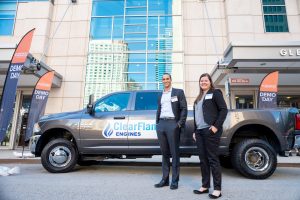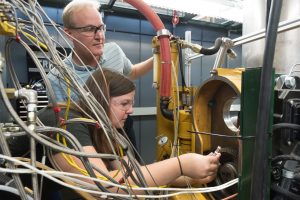
While those tests are performed at a farm in the Midwest, ClearFlame Engines co-founders Julie Blumreiter and B.J. Johnson will be commercializing their engine, which could change the long-haul, heavy-duty trucking industry, reduce air pollution and provide lower shipping costs to businesses. Those savings then could be passed on to consumers and help boost the economy.
They also will continue to cultivate partnerships with manufacturers of truck and engine parts, fuel suppliers, fleet operators, agricultural machine suppliers and other industries eager to use powerful, efficient and clean energy technology.
“This engine represents a low-cost, clean, and efficient platform that can be used in a wide range of heavy-duty applications,” said Johnson.
Diesel Innovation
The diesel engine has been vital to the trucking and other industries since its invention in 1897, according to various sources. Johnson and Blumreiter, who each earned their Ph.Ds. in mechanical engineering from Stanford University, now are taking that legendary engine to another level. In March 2017, they brought their idea and technology from Stanford to Chain Reaction Innovations (CRI), the entrepreneurial program at Argonne National Laboratory.
CRI identifies innovators with ideas for energy- and science-based technologies that can positively impact the lives of billions of people. The program, over a two-year period, provides innovators with the laboratory tools, seed capital and collaborators needed to grow their early-stage technologies to attract the long-term capital and commercial partners that can scale and launch their products into the marketplace.
Through CRI, the start-up is working at the Advanced Powertrain Research Facility at Argonne to develop the ClearFlame Engines technology to enable alcohol fuels to match the efficiency and torque of a diesel engine in a heavy-duty apparatus. It also shows a 100x reduction in engine soot, along with an exhaust stream with drastically simplified emissions, said Johnson.
“The expertise that we need, the world-class facility and the researchers have been great.”
Julie Blumreiter, Chief Technology Officer, ClearFlame Engines
ClearFlame’s product is also about 10 percent less expensive to operate and cleaner for the environment. While others have offered technologies that retrofit engines, ClearFlame will integrate their technology at the production level, converting the popular diesel engines to run on cleaner fuels, like ethanol and natural gas, in a way that increases performance and significantly lowers the harmful emissions that these engines normally produce.
“Our innovation is modifying the engine combustion to use clean-burning, alternative fuels in a high-efficiency manner,” said Blumreiter.
Other engines in the industry are not able to provide the same combination of low emissions and high performance. The ClearFlame design also stands in contrast to traditional alternative fuel retrofits, which often do not run as efficiently, said Johnson.
Leveraging Argonne
Working at CRI, Blumreiter and Johnson were able to customize existing platforms at Argonne, which saved them time and money, while tapping into Argonne’s expertise to further improve their technology, they said.
“The expertise that we need, the world-class facility and the researchers have been great,” Blumreiter said.
Without the guidance and resources of CRI and Argonne, growing their business and developing the technology would have been harder. The opportunity also provided an inside path to the Chicago and Midwest energy ecosystem, allowing them to network and build a start-up, Blumreiter and Johnson said.
“Working with ClearFlame Engines within the CRI program has presented an exciting opportunity to advance engine technology for the heavy-duty transportation sector using Argonne’s high performance computing resources and expertise in computational fluid dynamics,” said Gina Magnotti, postdoctoral appointee at Argonne’s Energy Systems Division.

“We’ve been able to develop computational models that empower ClearFlame to explore new designs and strategies to further optimize the efficiency and emissions benefits of their technology,” said Magnotti.
In addition to helping them to develop a clean technology, CRI taught ClearFlame about investor demands. The experience also allowed them to more readily apply for grants and mention their CRI experience, which showed they had both business and technical vetting to boost their credibility, they said.
“CRI started as a gateway into Argonne and, hopefully, it will help us transition to a mutually-beneficial, longer-term relationship with the lab,” said Johnson.
As members of CRI’s first cohort of innovators, ClearFlame Engines is just beginning to show the magnitude of the positive impact that the program has had on their progress. The CearFlame team is eager to build on the results gathered in their collaboration with Argonne, which demonstrated the improved energy efficiency realized with their technology in a single cylinder test stand. The next steps include technology validation and preparations to do field demonstrations, utilizing an engine provided by an industrial partner.
Read more about the impact of CRI innovators.

